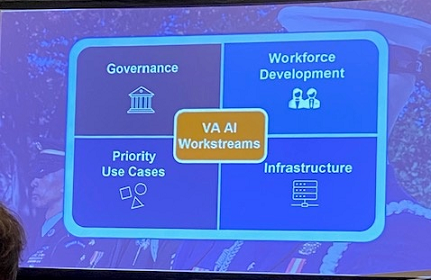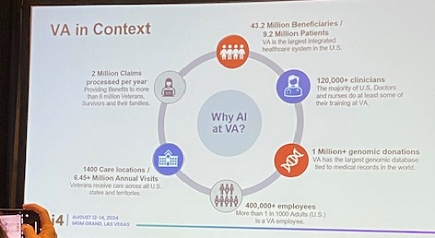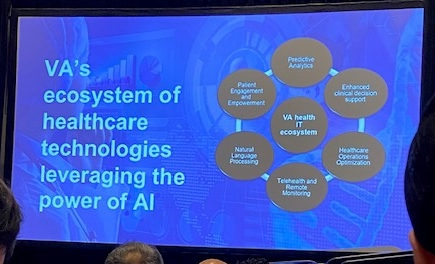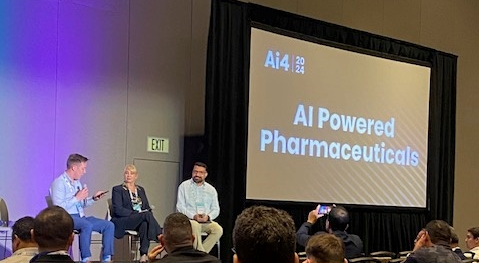 Established in 2018, Ai4 is now the epicenter of the global AI ecosystem and the industry’s only must-attend annual event. Showcasing the latest applications, the state of generative AI, and best practices shaping the future of artificial intelligence.
Established in 2018, Ai4 is now the epicenter of the global AI ecosystem and the industry’s only must-attend annual event. Showcasing the latest applications, the state of generative AI, and best practices shaping the future of artificial intelligence.
In a year where AI has consumed most of the oxygen in healthcare innovation and conversation, what is being highlighted this year in the Healthcare track at Ai4? Here are some day 2 sessions. And check out more coverage of the event.
A Peek Into AI at VA
Terry Luedtke, Director of Product Engineering, Electronic Health Records Modernization Integration Office, U.S. Department of Veterans Affairs
Kaeli Yuen, Artificial Intelligence Product Lead Office of the Chief Artificial Intelligence Officer, U.S. Department of Veterans Affairs
An overview and sample case studies of Artificial Intelligence organization and application at the Department of Veterans Affairs. With all the bad press the VA has received on their multi-leveled EHR rollout these past few years, it is nice to see the department continuing modernization on all fronts including AI.
Using AI Tech Sprints is providing a novel approach to innovation to meet Veteran needs. AI Tech Sprints are three-month competitive engagements that foster collaboration between industry, academia, and the Department of Veterans Affairs (VA). Teams compete to create AI-enabled tools that leverage federal data to address specific Veteran health care issues.
Here are a few slides of interest during their session.




AI Powered Pharmaceuticals
Barbara Latulippe, Head of Enterprise Data, CDO, Takeda
Charles Jones, Senior Director, Platform & Early Commercial Strategy Lead, Pfizer
Abhishek Pandey, Global Lead – Pharma Discovery, AbbVie

Like radiology, pharma is all in with the transformative potential of AI within the pharmaceutical sector. The panel offered insights into how AI algorithms are fast-tracking drug discovery, personalizing patient treatments and optimizing clinical trial designs. The panel was leading experts from the pharma and AI industries that shared real-world cases of AI successfully predicting drug interactions, enhancing bioinformatics research and tailoring treatments based on genetic data. By integrating AI’s predictive capabilities, the pharma industry stands at the brink of revolution, promising safer drugs, faster time-to-market and treatments that are customized to individual patient profiles.
Interesting notes:
- Seeing the pace of innovation increase
- New company structures to incorporate AI
- Setting up positions and councils to govern and oversee the incorporation of AI
- Big Tech and Big Pharma are now competing for technical coders and ML experts.
- From discovery to patient journeys, AI can be used
AI for Monitoring Patients After Discharge from Hospital: Current State and Future Opportunities
Krishnaj Gourab, Chief Medical Officer – University of Maryland Rehab and Ortho. System Medical Director, Post Acute Care – UMMS. Adjunct Faculty – Biomedical Informatics and Data Sciences, Johns Hopkins University. University of Maryland Medical System
It is estimated that about one in five patients suffer an adverse health event in the weeks following discharge from the hospital, with a majority of such events being preventable or ameliorable. Effects range from exacerbation of symptoms to permanent disability and mortality. Underlying reasons range from poor information transfer (to providers outside the hospital) to complex psychosocial issues. With their unmatched capabilities in pattern recognition and prediction, AI-enabled systems can have a significant role in preventing such adverse events.
Discussions on:
- AI-enabled clinical systems for the surveillance of patients recently discharged from the hospital
- unique challenges of deploying AI-enabled systems outside the relatively controlled environment of the hospital
- the characteristics of systems that have been successful in this milieu, versus systems that perform well in test environments but produce suboptimal results when deployed in the real world
- possible opportunities for AI systems in this space, and the clinical imperatives and policy changes that will contribute towards creating such opportunities.
H2O Top 100
H2O.ai is celebrating their first H2O AI 100 list that recognizes the top 100 individuals driving innovation and impact in artificial intelligence across industries and sectors globally. This year’s list features many prominent speakers and attendees from the Ai4 conference.
🚀 https://t.co/AHCQLzjMBA presents the first-ever AI 100 Leaders of 2024! We’re honoring AI leaders across Enterprise, Public Sector, and more. Special mention to 25 leaders from top banks like CBA, Wells Fargo, and JPMorgan.
Full list 👉 https://t.co/jSVPSwn8P5 #AI100 #H2Oai pic.twitter.com/8lpaoWriGV
— H2O.ai (@h2oai) August 14, 2024
